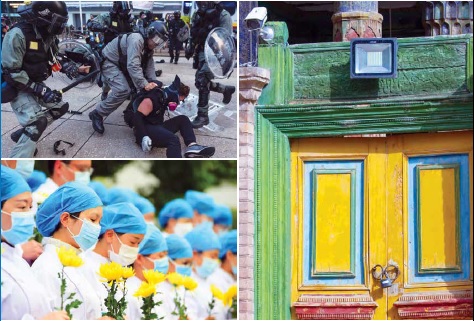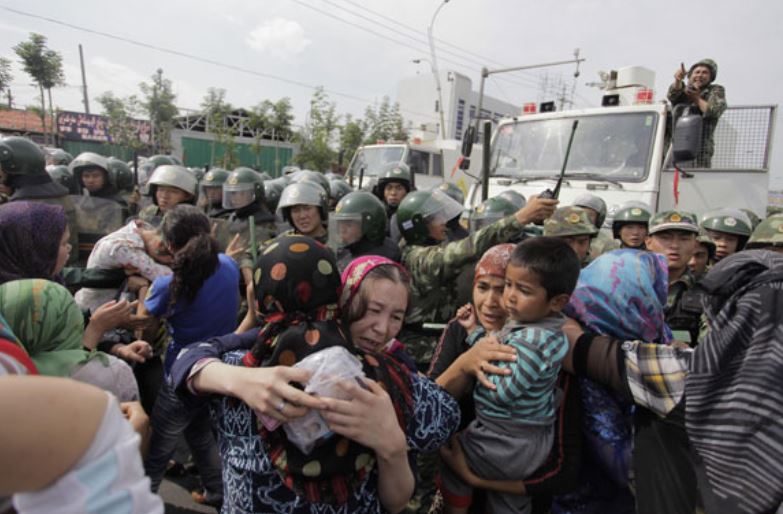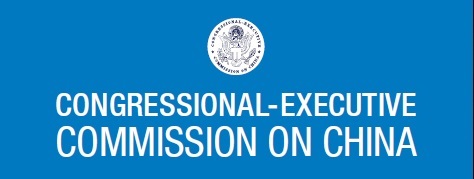
- The US Congressional-Executive Commission on China (Commission) found that the Chinese government and Communist Party have taken unprecedented steps to extend their repressive policies in Xinjiang, Hong Kong and Tibet
- The report says that disturbing new evidence has emerged of a systematic and widespread policy of forced sterilization and birth suppression of the Uyghur and other minority populations.
- In Hong Kong, the “one country, two systems” framework has been dismantled, severely undermining the rule of law and respect for human rights that the territory has long enjoyed, says CECC.
- In Tibet, the report observes that religious freedom continued to be severely curtailed as new measures have been implemented to manage and shape Tibetan Buddhism as part of the policy of “sinicizing religion.”
- Chinese officials used the heavy hand of repression, censorship, and secrecy to control the public narrative during the outbreak of the COVID–19 pandemic, says the report.
- Other findings include Criminal law and police power in China that continued to be used to punish government critics, rights advocates, religious believers, and ethnic minority groups.
- CECC co-chair, Democratic Representative Jim McGovern, called China’s actions to crush human rights in the past year “shocking and unprecedented” and urged Congress and the incoming Biden administration to hold Beijing accountable.
The US Congressional-Executive Commission on China (Commission) found that the Chinese government and Communist Party have taken unprecedented steps to extend their repressive policies through censorship, intimidation, and the detention of people in China for exercising their fundamental human rights. “Nowhere is this more evident than in the Xinjiang Uyghur Autonomous Region (XUAR) where new evidence emerged that crimes against humanity—and possibly genocide—are occurring, and in Hong Kong, where the “one country, two systems” framework has been effectively dismantled”, says the CECC’s annual report. (Opens PDF)
Repression and genocide in Xinjiang

The report categorically states that the policies of the Chinese government in Xinjiang and Hong Kong are in direct violation of China’s Constitution, which guarantees “freedom of speech, of the press, of assembly, of association, of procession and of demonstration,” as well as “freedom of religious belief.” The actions of the Chinese government also contravene both the letter and the spirit of the Universal Declaration of Human Rights; violate its obligations under the International Covenant on Civil and Political Rights, which the Chinese government has signed but not ratified; and violate the International Covenant on Economic, Social, and Cultural Rights, ratified in 2001. Further, the Chinese government has abandoned any pretense of adhering to the legally binding commitments it made to the international community when it signed the 1984 Sino-British Joint Declaration on the future of Hong Kong, says the report.
The United Nations says upto 1.8 million Uighurs n Uyghurs, Kazakhs, Kyrgyz, Hui, and others have been arbitrarily detained in Xinjiang in a system of extrajudicial mass internment camps where they are subjected to forced labor, torture, and political indoctrination. Faith leaders, activist groups and others have said crimes against humanity, including genocide, are taking place there. Beijing denies these accusations and says that it is only ‘discipling’ them.
Pinning the blame on the HR violations on President and Party General Secretary Xi Jinping, the report says that he has tightened his grip over China’s one-party authoritarian system, and the Party has further absorbed key government functions while also enhancing its control over universities and businesses. Authorities promoted the official ideology of “Xi Jinping Thought” on social media and required Party members, government officials, journalists, and students to study it, making the ideology both pervasive, and for much of the country, mandatory.
The report says that disturbing new evidence has emerged of a systematic and widespread policy of forced sterilization and birth suppression of the Uyghur and other minority populations. These trends suggest that the Chinese government is intentionally working to destroy Uyghur and other minority families, culture, and religious adherence, it says.
The CECC report called for a formal US “determination on whether atrocities are being committed” in Xinjiang, and such a determination is required within 90 days of US legislation passed on December 27.
“One country, two systems” framework in Hong Kong dismantled

The report dedicates a major portion of its finding to Hong Kong and suppression of pro-democracy activities there. In Hong Kong, the “one country, two systems” framework has been dismantled, severely undermining the rule of law and respect for human rights that the territory has long enjoyed, says CECC.
The political turmoil in Hong Kong over the past year is the result of the Hong Kong and Chinese governments’ refusal to address the legitimate demands of the Hong Kong people that excessive police violence against peaceful protesters be stopped and investigated. Authorities arrested pro-democracy leaders, prevented journalists from reporting, applied political pressure on the judiciary, and allowed the Hong Kong Police Force to grow increasingly abusive toward non-violent protesters.
Instead of reducing tensions, the Chinese government bypassed Hong Kong’s Legislative Council to impose national security legislation that directly threatens Hong Kong residents’ right to due process, as well as their freedoms of expression and association. The legislation is clearly meant to target, intimidate, and silence Hong Kong’s robust civil society, including the many organizations that have advocated for human rights in mainland China from the relative safety of Hong Kong, says the CECC report.
Recalling the Tiananmen massacre, the CECC report says that Chinese officials continue to avoid transparency and accountability to the families of those killed, tortured, imprisoned, or exiled for their participation in the pro-democracy demonstrations in Tiananmen Square and throughout China during the spring of 1989.
Religious freedom severely curtailed in Tibet

In Tibet, the Chinese government continued—as it has for over a decade—to block dialogue with the Dalai Lama, his representatives, or the Central Tibetan Administration toward a negotiated agreement, says the report. It observed that religious freedom continued to be severely curtailed as new measures were implemented to manage and shape Tibetan Buddhism as part of the policy of “sinicizing religion.”
Chinese officials continued to claim that they have the sole authority to select the next reincarnation of the Dalai Lama, in violation of the religious freedom of the Tibetan Buddhist community. In the Tibet Autonomous Region, new regulations on “ethnic unity” were passed this year that mandate acceptance and promotion of government ethnic and religious policy.
It has been 25 years since Gedun Choekyi Nyima, the 11th Panchen Lama, was abducted along with his parents and forcibly disappeared. Since then, they have not been seen or heard from by anyone outside China, and to this day they remain among the world’s longest detained political and religious prisoners. The members of the Commission continue to call for their immediate and unconditional release, states the CECC report.
Attempts to cover-up COVID–19 origins

The outbreak of COVID–19 in Wuhan municipality, Hubei province, in late 2019 caused incalculable suffering for the people of China and presented a major challenge to the Chinese Communist Party’s leadership, says the report. The strategy employed by the Chinese government in response to the pandemic echoed its responses to other domestic and international challenges.
Chinese officials used the heavy hand of repression, censorship, and secrecy to control the public narrative in a manner designed to preserve the political legitimacy of the Party. Attempts to minimize the severity of the outbreak by censoring vital information and silencing doctors exacerbated the spread of COVID–19 in China and around the world, it says.
Instead of providing a full and transparent accounting of the emergence of the novel coronavirus in China, the Chinese government pushed back against calls for an independent international investigation, the CECC alleges.
Other Concerns
The CECC report also finds China guilty of suppressing free speech and targeting journalists. “In 2019, China reportedly had detained the highest number of journalists in the world”, it says.
Other findings include Criminal law and police power in China that continued to be used to punish government critics, rights advocates, religious believers, and ethnic minority groups. Five years after the July 2015 “709 Crackdown” on human rights lawyers and rights defenders, many of those Chinese lawyers and rights defenders are surveilled by public security authorities in what one leading expert has termed “non-release release.” Lawyers continued to face repression, intimidation, and punishment for attempting to protect human rights in China, the report says.
As per the report, Women in China have faced even more difficult circumstances due to the disproportionate risks and burdens associated with the essential role they have played in the COVID–19 response. During the pandemic, domestic violence rose substantially, and experts predicted that already existing gender gaps in employment and well-being would be further exacerbated by the economic and social disruption caused by the outbreak.
The report states that as Independent trade unions are banned in China, Labor rights advocates and citizen journalists continue to be targeted and detained for their work, including for documenting numerous workers’ strikes and subsequent crackdowns.
The report also alleges that the Chinese government is developing technology and utilizing artificial intelligence (AI) to expand mass surveillance and social control of its citizens.
Report Recommendations

CECC co-chair, Democratic Representative Jim McGovern, called China’s actions to crush human rights in the past year “shocking and unprecedented” and urged Congress and the incoming Biden administration to hold Beijing accountable. “The United States must continue to stand with the people of China in their struggle and lead the world in a united and coordinated response to the human rights abuses of the Chinese government,” he said.
The CECC calls upon the U.S. Government to develop coordinated policies that press the Chinese government for greater transparency, reciprocity, and adherence to international rules and norms. The recommendations calls for:
- The US Administration to quickly implement the Uyghur Human Rights Policy Act and work with Congress on necessary steps to address likely atrocity crimes in the Xinjiang Uyghur Autonomous Region
- Stop goods made with forced labor in or from the Xinjiang region from Entering U.S. Markets
- The Administration should fully implement the Hong Kong Human Rights and Democracy Act, including by issuing robust reporting on the status of Hong Kong’s autonomy
- The Administration should help sustain Tibetan culture and identity. Congress should also pass the Tibet Policy and Support Act ( to further affirm the protection of Tibetan human rights in U.S. policy, strengthen the role of the U.S. Special Coordinator for Tibetan Issues, and address Chinese government interference in the selection of Tibetan religious leaders and a future 15th Dalai Lama.
- The Administration and Congress, in a bipartisan fashion, should communicate to the American people the nature, scope, and scale of the human rights challenges while clearly differentiating the peoples and cultures of China from the Chinese government and Communist Party.
- US Administration officials and Members of Congress should clearly communicate that the civil rights of U.S. citizens and residents of Asian
and Chinese descent, and Chinese nationals living or studying in the United States, will be protected, including freedom from coercion or intimidation, freedom of expression, and the freedom of religion. - U.S. officials should also publish relevant information about the Chinese government, Communist Party, and entities and individuals engaged in malign foreign influence operations, including through passage by Congress of the Countering the Chinese Government and Communist Party’s Political Influence Operations Act
- The Administration and Congress should work together to address the challenges posed by Chinese government disinformation, economic coercion, and malign political influence operations in the United States
- The Administration and Congress should work together to update and expand the requirements of the Foreign Agents Registration Act (FARA) to address the unique challenges posed by the Chinese government’s attempts to acquire technologies banned under U.S. export controls and limit academic freedom by acting through organizations like Chinese Students and Scholars Associations and Confucius Institutes.
- The US President should issue a policy directive to develop a comprehensive strategy embedding human rights, the rule of law, and democratic governance and development goals into the critical mission strategies of all U.S. government entities interacting with the Chinese government, both bilaterally and through international organizations, and expand interagency coordination efforts to counter disinformation, censorship, malign political influence operations, or economic coercion, particularly those targeting diaspora communities, U.S. colleges and universities, and U.S. partners and allies.
- The U.S. representatives to the International Bank for Reconstruction and Development (IBRD) should continue to oppose new lending, pursuant to China’s “Tier 3” designation for significant trafficking of persons
- The Administration should strategically use the list-based sanctions available in the Global Magnitsky Human Rights Accountability Act to ensure that Chinese officials complicit in human rights violations, including severe religious freedom restrictions and human trafficking, cannot benefit from access to the United States or its financial markets.
- Congress should ask the relevant executive branch departments and agencies to identify and list Chinese companies and entities that have provided material support or technical capabilities in violation of U.S. law and that facilitate human rights abuses in China, including in the XUAR and Tibetan areas of China, and require the Securities and Exchange Commission to strengthen disclosure and auditing requirements for any listed Chinese companies in U.S. capital markets to ensure that U.S. retirement and investment dollars are not funding companies with links to the Chinese government’s security apparatus or malevolent behaviour.
- The Administration should work with allies and partners to strengthen the International Health Regulations (IHR) to make clearer obligations for member states and consequences for those that fail to provide timely and transparent information about infectious disease outbreaks
- Congress and the Administration should counter internet censorship in China, including by actively opposing the Chinese government’s efforts to establish a new international norm on “internet sovereignty”;
- The Administration should coordinate with like-minded allies and partners on public statements, diplomatic demarches’, technical assistance programs, and public diplomacy efforts to condemn arbitrary detention, torture, and other serious human rights abuses in China, and creatively communicate these efforts to the Chinese people.
- The Administration should use all the tools available in the International Religious Freedom Act, the Frank Wolf International Religious Freedom Act, and Executive Order 13926 to improve U.S. religious freedom diplomacy and provide targeted responses to escalating religious freedom abuses affecting all of China’s diverse religious communities.
- Members of Congress and Administration officials at the highest levels should raise specific prisoner cases in meetings with Chinese government officials.
In October, Trump’s national security adviser, Robert O’Brien, said Beijing was perpetrating “something close to” genocide in Xinjiang and other officials have referred to concentration camps there.
A US genocide declaration would mean that countries would have to think hard about allowing companies to do business with Xinjiang, a leading global supplier of cotton. It would also raise pressure for further US sanctions against China.
On Wednesday, US Customs and Border Protection said the US was imposing a region-wide ban on all cotton and tomato products from Xinjiang over allegations that they are made with forced labour by detained Uighurs.
The Biden administration is expected to continue the China-policy of the Trump administration though it may not be as vocal as the incumbent administration. The CECC report serves as a ready reckoner for the crimes of China and also as the indicator for the US policies on China.
